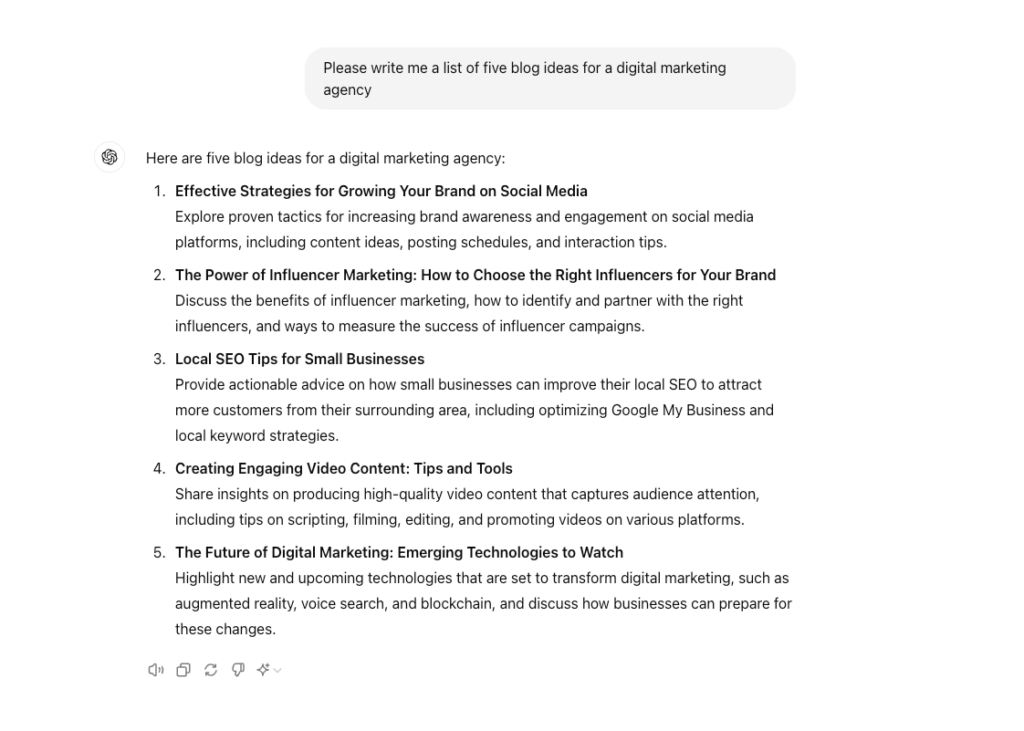How to Use AI In Digital Marketing Responsibly
- Marketing Strategy

ChatGPT can do a lot of things—share recipes, write love letters, and even attempt to diagnose your symptoms. But despite its impressive resume, we know its answers can’t be trusted blindly. With these abilities and limitations in mind, how can you use AI in digital marketing to support your strategy?
Let’s dive in.
What Is AI?
Artificial intelligence (AI) is a technology that allows computers to mimic human behavior and intelligence. These programs can learn, problem solve, and rationalize. The algorithms that drive AI can range in complexity depending on the task it performs.
Machine learning is a subset of artificial intelligence where machines use massive datasets and past experiences to improve their accuracy. They can detect patterns and predict future trends with limited human intervention.
Machines can also understand and generate human language thanks to natural language processing (NLP), a model that uses machine learning to analyze text and spoken word. We see NLP in action almost every day with:
- Spell check
- Search engines
- Online chatbots
- And more
You can find tools to support your AI marketing strategy for copywriting, productivity, editing, automation, thumbnails, brand monitoring, and so much more. But just because you can use them, doesn’t mean you always should.
Responsible Use Of AI
Before we dive into how to use AI in digital marketing, we need to outline how to do it responsibly so you don’t put your company at risk. AI technology can be a great resource for teams to speed up content creation, improve their workflow, and automate tasks, but there are also some cons to watch out for.
With these cons in mind, here are our tips to ensure the responsible use of AI.
- Establish clear goals for how you plan to use AI for your business.
- Don’t use AI-generated content without adding a human touch.
- Always fact-check the information you get from AI.
- Before publishing AI content, check for plagiarism.
- Make sure the training used for AI is properly licensed.
- Be transparent when using AI-generated content or images in your marketing.
- Use AI as a starting point, but not for full content generation.
Keep reading for our suggestions on how to responsibly use AI in various parts of your marketing strategy.

Using AI In Digital Marketing
Looking to develop an AI marketing strategy for your business, but not sure where to start? This technology can benefit every department, and today we’re outlining the best (and most responsible) ways to use AI in digital marketing.
SEO & PPC
Artificial intelligence is a valuable tool to increase your rankings in SERPs. AI can recommend schema markup, perform backlink analysis, write alt text and meta titles, and track performance to understand trends in your data. You can also use AI to assist in keyword research. Programs like ChatGPT can generate short- and long-tail keywords related to your topic.
Whether you’re using Microsoft Ads or Google Ads, AI can level up your PPC game by helping write and edit ad copy, finding high-traffic keywords, and efficiently allocating your budget with smart bidding.
We couldn’t talk about AI without touching on SGE. Search Generative Experience (SGE) is a technology that uses machine learning and NLP to provide dynamic Google search results called “AI Overviews.” It can give quick answers to questions, link to sources, and provide custom responses based on your search history, location, and more.
Since Google’s AI Overviews often take the top spot in SERPs, understanding how they work is essential.
Our Favorite AI Marketing Tools For SEO:
Content & Email
When you think about using AI in digital marketing, your brain often jumps to content creation. But instead of using AI to generate an entire blog post for your website, try using it as a resource in the creative process.
Why? Because your goal is to create unique content that meets peoples’ needs and tells your brand story, and AI cannot connect to users on a human-to-human level. This means they cannot produce content that performs. At least, not without your help.
Sometimes the hardest part is getting the creative juices flowing. Eliminate blank screen syndrome by using AI to brainstorm content ideas, blog outlines, and newsletter topics. For the best output, make sure you provide a detailed prompt. Give ChatGPT (or the AI program of your choice) context to understand what it’s creating and for whom.

ChatGPT helps our team optimize the content we create, but it does not write it for us. It can aid in incorporating keywords, providing grammar suggestions, tweaking headlines, and writing subject lines that get noticed. You can also use it for manual tasks, like formatting data and contact information, to stay organized.
Our Favorite AI Marketing Tools for Content:
- ChatGPT
- Gemini
- TextFX
- ScholarGPT
- Headline Studio
- ContentShake
- SEO Writing Assistant
- ActiveCampaign’s AI tools
Design
From DALL-E to Adobe Firefly, there are dozens of programs out there that can generate any image or video you want at the click of a button. These are great to use as inspiration for your next campaign, but just like with content and SEO, AI should not be a replacement.
AI can be used for brainstorming ideas and creating mood boards for a project. It can assist with image editing, background removal, and accessibility audits. AI can also automate tasks like resizing, cropping, and color correction to give you more time for creative work.
Our team’s favorite AI tool is Photoshop’s Generative Fill feature. This uses AI to add or remove anything from an image. It is especially helpful to expand the edges of a picture to give you more room in your design.
Everyone’s biggest question when it comes to design is: can you use AI-generated images for public media? Unfortunately, the answer is a little complicated, and the rules are changing every day.
The U.S. Copyright Office has stated that AI-generated images are not protected by copyright. So while they are technically legal to use, there are ethical concerns. AI programs don’t credit the artists they mimic or get consent before using copyrighted material to train. They can end up creating derivative works of the original piece, which would raise legal questions if used.
The safest option for you and your brand is to rely on graphic designers—not AI—to create your marketing visuals.
Our Favorite AI Marketing Tools For Design:
Analytics & Reporting
The last way you can use AI in digital marketing is in analytics. Artificial intelligence can sort through data and discover insights, trends, and relationships to help guide your strategy moving forward. Limited experience in data visualization? No problem! Some AI tools can collect data from a variety of sources and create user-friendly reports and dashboards.
Artificial intelligence is also built into Google Analytics 4 to give you custom insights into your website’s performance. With predictive audiences and metrics, you can leverage AI to forecast user behavior and optimize your campaigns.
Our Favorite AI Marketing Tools for Analytics:
- Data Analysis and Report AI by ChatGPT
- Google Analytics 4
Can Digital Marketing Be Replaced By AI?
No one likes the thought of a robot doing their job, but can it do your job well? Remember, AI is only as good as the person prompting it. It’s a tool to enhance your work, but in our opinion, it cannot replace digital marketing skills completely. As Robert Rose of the Content Marketing Institute put it, AI-generated content is “leading us into an age of sophisticated mediocrity.”
As digital marketers, we should strive for more than that.
We should strive to deliver high-quality, engaging content to our audience. From the ads we design to the emails we send and everything in between, we should know what our customers want at every stage. Since AI lacks human judgment, it cannot do this at a professional level.
That’s why we will always need marketers to make AI content more relevant, more credible, and more impactful. You have a perspective AI does not. And only you know what good content looks like.
Still not sure why human-first digital marketing is worth it? Explore our case studies to see how our strategies drive results.
 By April
By April  Tim
Tim  Lauren
Lauren